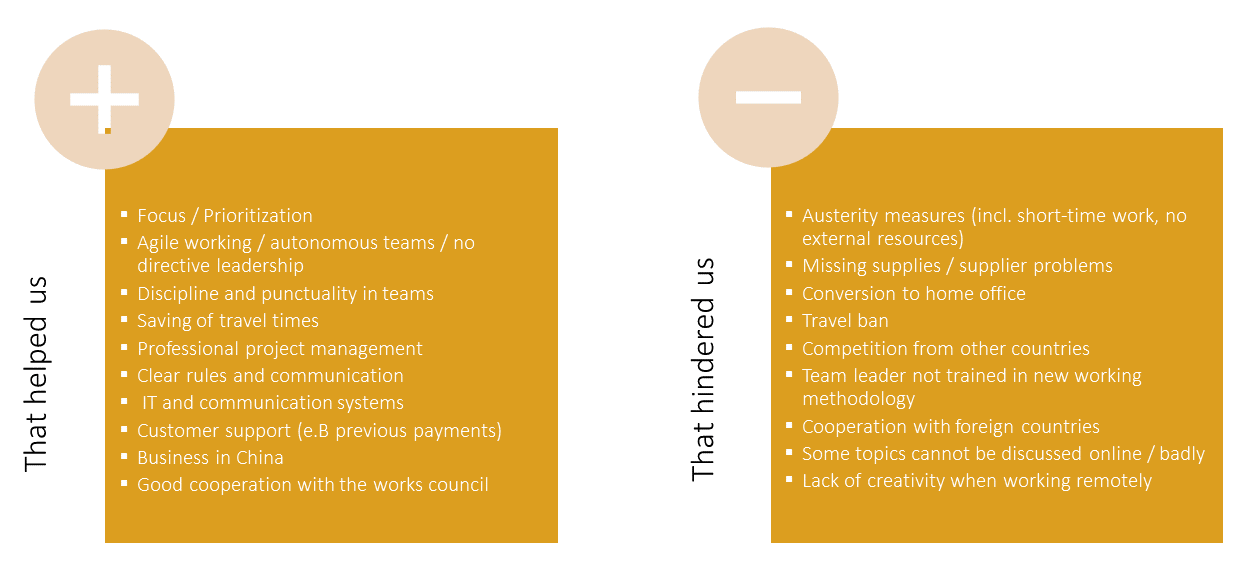20. Januar 2022
Corporate culture becomes a gamechanger in the crisis
How well did the SME sector survive the Corona crisis? Were companies even able to benefit from it, and if so, what was the prerequisite for success? Our CO Improve survey clearly shows that there are factors, such as sector affiliation, over which companies have no influence. But several levers for getting through crises well and seizing opportunities emerged: a culture of trust, good organisation, clean processes and ideally agile working.

Even if the incidences are rising again: The majority of German employees are doubly vaccinated, home-office arrangements have been established and the company is often organised in hybrid working models. It is becoming apparent that the factors influencing turnover during the Corona pandemic have largely lost their effect and are hardly relevant any more. Time to take stock. CO Improve asked its clients from various sectors about this and analysed the current status quo. Questions included how the crisis affected the companies, how they dealt with the new circumstances and whether there were any important insights that led to changes. In addition, it was addressed whether companies see themselves well prepared for the future.
The companies surveyed were hit rather moderately by the crisis in terms of results and turnover. On a scale between 1 and 10 (not at all or very strongly), the average value was 4.54. However, there was a large spread around the average value - so there are definitely companies that were strongly affected, but also those that were able to really profit.
Research and development during Corona
The survey also looked at the impact of the crisis on R&D projects in companies. Here, too, the answers varied: those companies that were also more strongly affected in terms of turnover and earnings tended to experience greater restrictions. Others were able to continue their activities largely unrestricted.
Question: "Have all R&D projects been able to be continued without restriction - i.e. without loss of time or content - since the beginning of the crisis until today?"
Some of the stumbling blocks and obstacles were restrictive cost-cutting measures such as short-time work or the suspension of the use of external resources. In addition, piloting or validation could not always be carried out without further ado, as virtual work was only possible to a limited extent for these process steps. If projects could be continued as far as possible despite the restrictions, the companies surveyed identified agile working, focus and prioritisation as well as process discipline as the most frequent factors for success. In addition, a well-functioning IT infrastructure with sufficient communication bandwidth was also necessary. Most of the companies had already found this framework condition or were able to create it in a short time.
Question: "What are the reasons why projects could or could not be continued?"
About 60 percent of the companies surveyed already had experience with agile working in the development of mechatronic products. They were also largely in agreement that agile working had demonstrated advantages over classic methods during the crisis. It is clear that companies that had not used agile methods before the crisis were hit harder by the effects. Agility can therefore be seen as an essential factor of a resilient organisation.
Changes to product portfolio and organisation
The crisis has caused changes in the product portfolio of about one third of the companies. Interestingly, this was mainly the case for those that felt less of a negative impact on turnover and results. Accordingly, they were more able to take advantage of additional opportunities that arose with customers and markets.
About 60 percent of the respondents stated that the experiences from the crisis will lead to changes in the organisation or processes: The proportion of time spent in the home office is growing and some companies have cancelled rented office space this year, confident that hybrid working will not remain a temporary phenomenon. Communication with customers and partners will also be more virtual, leading to significant adjustments in sales, marketing and service processes. The acceptance among customers to be addressed in this way has never been greater. All companies should use this opportunity to build a trustworthy network virtually.
A culture of trust and good preparation
Overall, the human factor is more in the foreground: many management techniques fail when working virtually or clearly lose efficiency. Employees have to organise themselves in their teams and managers have to learn that employees also work intensively and with commitment in the home office.
The winners here are clearly companies that invested in a culture of trust in good time and did their homework before the crisis by clearly defining the corporate strategy and planning or procuring the necessary competences and capacities. Because this factor also seems to be a driver of success in the crisis.
The picture is consistent: Companies whose employees are used to working in a self-organised way in a relationship of trust - ideally but not necessarily agile - have an advantage. Employees are best able to generate good results when the environment is well prepared. This means that the strategy is clear and is lived, the teams are adequately staffed and all the necessary competences are available to a sufficient extent. Stable and well-documented processes are also a success factor, because if cooperation is mainly virtual, there are no rooms for the small consultations in the coffee kitchen or in the aftermath of meetings. As a result, processes become much more important for orienting staff as to when what needs to be done and are a crucial efficiency driver.
It is not surprising that companies that were less severely affected by the pandemic also see themselves as better prepared for the future. Overall, the participants here achieve an average score of around 7.5. However, there is a wide spread in the assessment here as well.
Question: "Do you feel your development area is well prepared for similar crises in the future?"
Key findings from our CO Improve survey
It is always worth investing in the resilience of one's own organisation and processes. In this context, agility is a demonstrable success factor. Whether companies were hit by the effects of the pandemic depended on many factors such as the industry: Companies from the automotive or supplier sector tended to be hit harder than other sectors. It has also been shown that the ability to deal with these impacts varies. It is important to promote and develop these abilities. After all, resilient companies are better able to recognise opportunities in changes in the market or among their customers and to take advantage of them: another factor that contributes to stabilisation in a crisis.
It is also evident that strategically thinking entrepreneurs learn from experience and initiate the necessary changes based on this. The pandemic has shown that resilience does indeed protect and that there are concrete levers to become (even) more resilient. CO Improve can help to identify and assess the relevant factors and select those that can be used to achieve improvements.
Conclusion
Resilient companies get through crises better: On the one hand, they can deal with the challenges more easily, learn from mistakes and make appropriate adjustments and, on top of that, recognise opportunities when they arise. Apart from sector affiliation, three factors have turned out to be relevant for success in a crisis: Corporate culture, work organisation and clean processes.



